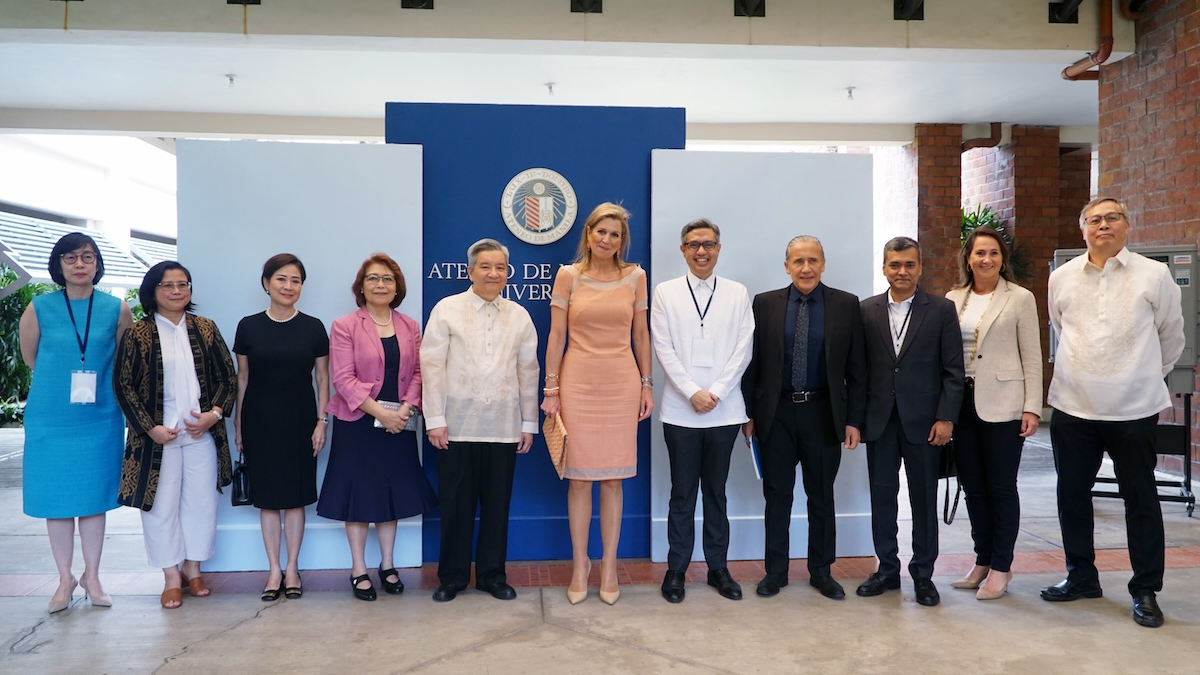Ateneo, Co-Develop launch Business Insights Laboratory for Development (BUILD) center
27 May 2024
Left to right: Ms Lisa Gokongwei-Cheng, Dr Czarina Saloma-Akpedonu, Ms Bernadine Siy, Dr Maria Luz Vilches, Fr Roberto Yap SJ, UNSGSA HM Queen Máxima of the Netherlands, Dr Roberto Galang, His Excellency Gustavo Gonzalez, Mr CV Madhukar, Her Excellency Marielle Geraedts, Dr Randy Tuaño. (Photo by Andrea Bautista)
On 23 May 2024, Ateneo de Manila University and Co-Develop launched the John Gokongwei School of Management's (JGSOM's) Business Insights Laboratory for Development (BUILD) center. The new BUILD center will house the Philippine Technical Resource Lab (TRL), a joint project between Ateneo JGSOM and Co-Develop, a global nonprofit fund dedicated to accelerating the adoption of safe and inclusive shared digital public goods.
Honoring the launch was Her Majesty Queen Máxima of the Netherlands, the United Nations Secretary-General’s Special Advocate for Inclusive Finance for Development (UNSGSA). She was accompanied by His Excellency Gustavo Gonzalez, United Nations - Resident Coordinator in the Philippines; and Her Excellency Marielle Geraedts, Head of Mission and Ambassador, Embassy of the Kingdom of the Netherlands to the Philippines.
Representing Ateneo at the launch were Fr Roberto C Yap SJ, Ateneo de Manila University President; Ms Bernadine T Siy; Chairman, Ateneo de Manila University Board of Trustees; Ms Lisa Gokongwei-Cheng, Member, Ateneo de Manila University Board of Trustees; Dr Maria Luz C Vilches; Vice President for Higher Education; Dr Roberto N Galang, Dean of the John Gokongwei School of Management; Dr Czarina Saloma-Akpedonu, Dean of the School of Social Sciences; and Dr Randy Tuaño, Dean of the Ateneo School of Government.
Representing Co-Develop was its CEO Mr CV Madhukar. Co-Develop is a global nonprofit fund dedicated to accelerating the adoption of safe, inclusive, and scalable shared digital infrastructure to ensure society-wide inclusion in the digital economy. The fund promotes the deployment of Digital Public Infrastructure (DPI) in 50 countries building DPI over the next five years. It does this by making strategic investments to unlock bottlenecks in safe and inclusive DPI adoption by countries and build an evidence base to understand the impact of DPI.
The TRL is dedicated to bolstering local capacity and skills development for the deployment of DPI in the Philippines. It will provide Filipino organizations, in particular entrepreneurs, civil society, and small and medium enterprises (SMEs) the necessary tools, infrastructure, and expertise to enhance their economic competitiveness. These tools include advanced data analytics, artificial intelligence, behavioral science, financial modeling, and IT applications.
“Beyond finance and technology, this initiative will have a ripple effect that will show that financial inclusivity is key not only to economic and social mobility, but also in allowing people to fully participate in addressing issues that confront us – from sustainability to defending democratic spaces, to educational reform, to health, and a lot more,” said Fr Yap.
"This initiative is less about technology; and more about people. It’s about recognizing the entrepreneurial spirit of Filipino communities and facilitating their collaborative efforts to contribute to the digital transformation journey of the Philippines. By leveraging the transformative potential of shared digital infrastructure, we can unlock new opportunities and drive sustainable growth across the nation," commented Mr Madhukar.
One of the primary objectives of the TRL is to support the ongoing deployment of digital citizen services in the Philippines, beginning with the deployment of an inclusive national identification system. As part of this, the TRL will support the Philippine Statistics Authority (PSA) in expanding the use of the national ID system, which has been identified as crucial for ensuring secure and efficient access to services for all Filipinos.
The TRL will also focus on increasing awareness of DPIs among private sector stakeholders, including banks and financial institutions, educating them on how they can leverage these technologies, such as the national ID, to foster greater financial inclusion and interoperability.
As part of the proceedings, Her Majesty and the other guests at the launch were able to talk to several presenters who had set up booths at the TRL at JGSOM 402. These included MediMate, an application designed by Ateneo students application to harmonize medical health records, and Higala, a private Open Payments Platform that connects new players to enter the financial services market.
In addition, Fr Yap also presented Her Majesty with a token – a replica of the rosary that national hero Dr Jose Rizal had during his final days in incarceration at Fort Santiago before his execution. The original rosary is currently stored at Ateneo's University Archives.









